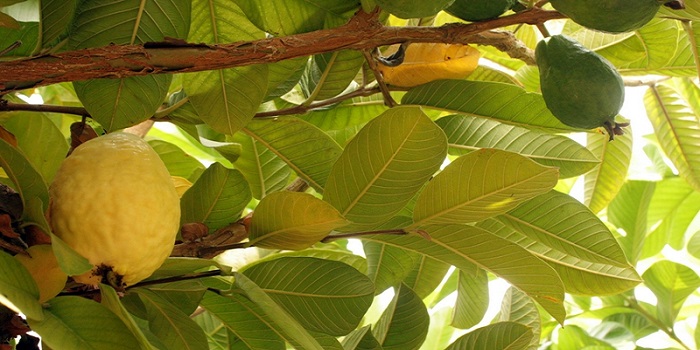Guava Revives Qalqiliyas Economy Despite its Decline This Year
Hundreds of Palestinians visit Qalqiliya City in the North of the West Bank these days to purchase the fruit of Guava. The visitor does inhale the distinctive smell of Guava from the outskirts of the city. Although Guava did revive Qalqiliya's economy, but it witnessed a decline this year.

Author: Baker Atteli | Translator: Abdul Hakim Odeh
Qalqiliya is considered as the capital of Guava in Palestine. Qalqiliya Farmers says that Guava is a part of the heritage of the city and it forms an important source of income per capita and the total income of the District.
The Farmers says that although the production rate fell to only 40-60% due to the climate changes and the bad weather conditions that hit the region, however this agriculture remains important and feasible.
20% of the Total Income
According to the Champers of Industry, Comers and Agriculture of Qalqiliya and the statistics of 2013 Guava generates approximately 20% of the total income of Qalqiliya District, this means around US $12 million annually.
This output is distributed on the domestic market by 80%, while the remaining rate of 20%, which equals to US $ 3 million, is being exported.
In 2014 Guava produced approximately 11 thousand tons, which mounted at US $15 million. Out of the total output, only 10% have been exported, which amounted nearly at US $1.5 million.
In Qalqiliya there are around 800 families, who are formed of more than 4000 individuals, are working and benefiting from the Guava Sector.
Zafer Salhab, Head of the Plant Production Department in the Qalqiliya Agriculture Directorate confirmed to the Palestinian Economic Gate that around 3 thousand Dounums are planted with Guava Trees, out of which 2.400 Dounums are economically productive, while the rest, which equals to one thousand Dounums are located behind the Separation Wall.
Salhab added that: "Each Dounum contains around 50 Guava Trees, which produces annually around 5 tons of Guava Fruits. There is a significant increase in the produced quantities due to the significant increase in the cultivation of Guava Tree".
He explained that in 2012 there were only 1200 Dounums planted with Guava in the Qalqiliya District, but in the past few years the area was doubled to become around 3 thousand Dounums.
Low Cost and Attractive Income
The Farmer Ghassan Abu Khader says that the cost of Guava cultivation is so low if compared to its viable economic output.
Abu Khader explains that: "The cost of cultivating Guava Trees per one Dounum, during the season of productive trees, with the exclusion of the infrastructure is estimated at NIS 1000, including the water and fertilizers".
In a comparison between the output per one Dounum, which is estimated at 5 tons, and the average price per kilo for Guava which is around NIS 4, the total value of Guava produced from one Dounum approximately values at NIS 20 thousand, during the whole season.
On his turn, Salhab explained that: "Guava is rapid in production, as the Guava Tree begins to produce in the third year of its planting".
Marketing Problem
Salhab believes that the basic problem of Guava is marketing, as he explains: "Guava Fruit has no ability to withstand for a long time after the harvest, as it loses its quality whenever the marketing is delayed, therefore it must be marketed in the next day of its harvesting as maximum".
He added that: "Guava harvest occurs is in a certain period of the year and it needs new additional markets besides to the local market".
Salhab pointed out that Guava exports to Jordan has began two years ago, where Jordan issues special permits to the farmers to export limited quantities of Guava in coordination between both Ministries of Agriculture in Jordan and Palestine.
On his turn, the Farmer, Ghassan Abu Khader says: "We are suffering from the problem of the permits, and organizing the time of its issuance, for example, last year the permits were delayed in the Jordanian Side, and the crossings were closed because of the Jewish holidays. Thus it resulted in the accumulation of the product in the refrigerators, and the export process was done once, which resulted in reducing the price of the product".
Abu Khader added that: "The problem of closing the borders occurs, because of the Jewish holiday which concedes at the same time of Guava production season, it is required to put pressure on the Israeli Side to open the crossings for specific period of time for the export of goods, so that the export process remains in regular basis, which will lead to maintain the quality and price of the product".
Investment Promotion
Salhab stated that the Ministry of Agriculture is trying since two years to find solutions to the export process; such thing will help in prices stability and prevents the manipulation of traders.
Salhab added that: "This sector becomes qualified to invest in when we find new markets for the product. In addition to that there is possibility to establish juices plant to use the extra output of Guava in the Guava Juice Industry".
He clarified that: "The current production is not great, but there is a significant growth in the cultivation of Guava, in case if there is possibility to find extra markets for Guava, the production quantity will be doubled".


